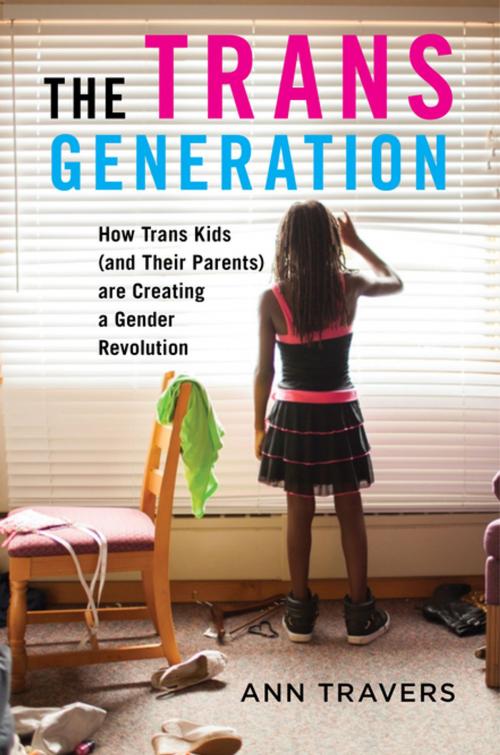The Trans Generation
How Trans Kids (and Their Parents) are Creating a Gender Revolution
Nonfiction, Social & Cultural Studies, Social Science, Gender Studies, Sociology| Author: | Ann Travers | ISBN: | 9781479832354 |
| Publisher: | NYU Press | Publication: | June 5, 2018 |
| Imprint: | NYU Press | Language: | English |
| Author: | Ann Travers |
| ISBN: | 9781479832354 |
| Publisher: | NYU Press |
| Publication: | June 5, 2018 |
| Imprint: | NYU Press |
| Language: | English |
Winner, 2019 PROSE Award for Anthropology, Criminology and Anthropology, presented by the Association of American Publishers
A groundbreaking look at the lives of transgender children and their families
Some “boys” will only wear dresses; some “girls” refuse to wear dresses; in both cases, as Ann Travers shows in this fascinating account of the lives of transgender kids, these are often more than just wardrobe choices. Travers shows that from very early ages, some at two and three years old, these kids find themselves to be different from the sex category that was assigned to them at birth. How they make their voices heard—to their parents and friends, in schools, in public spaces, and through the courts—is the focus of this remarkable and groundbreaking book.
Based on interviews with transgender kids, ranging in age from 4 to 20, and their parents, and over five years of research in the US and Canada, The Trans Generation offers a rare look into what it is like to grow up as a trans child. From daycare to birthday parties and from the playground to the school bathroom, Travers takes the reader inside the day-to-day realities of trans kids who regularly experience crisis as a result of the restrictive ways in which sex categories regulate their lives and put pressure on them to deny their internal sense of who they are in gendered terms.
As a transgender activist and as an advocate for trans kids, Travers is able to document from first-hand experience the difficulties of growing up trans and the challenges that parents can face. The book shows the incredible time, energy, and love that these parents give to their children, even in the face of, at times, unsupportive communities, schools, courts, health systems, and government laws. Keeping in mind that all trans kids are among the most vulnerable to bullying, violent attacks, self-harm, and suicide, and that those who struggle with poverty, racism, lack of parental support, learning differences, etc, are extremely at risk, Travers offers ways to support all trans kids through policy recommendations and activist interventions. Ultimately, the book is meant to open up options for kids’ own gender self-determination, to question the need for the sex binary, and to highlight ways that cultural and material resources can be redistributed more equitably. The Trans Generation offers an essential and important new understanding of childhood.
Winner, 2019 PROSE Award for Anthropology, Criminology and Anthropology, presented by the Association of American Publishers
A groundbreaking look at the lives of transgender children and their families
Some “boys” will only wear dresses; some “girls” refuse to wear dresses; in both cases, as Ann Travers shows in this fascinating account of the lives of transgender kids, these are often more than just wardrobe choices. Travers shows that from very early ages, some at two and three years old, these kids find themselves to be different from the sex category that was assigned to them at birth. How they make their voices heard—to their parents and friends, in schools, in public spaces, and through the courts—is the focus of this remarkable and groundbreaking book.
Based on interviews with transgender kids, ranging in age from 4 to 20, and their parents, and over five years of research in the US and Canada, The Trans Generation offers a rare look into what it is like to grow up as a trans child. From daycare to birthday parties and from the playground to the school bathroom, Travers takes the reader inside the day-to-day realities of trans kids who regularly experience crisis as a result of the restrictive ways in which sex categories regulate their lives and put pressure on them to deny their internal sense of who they are in gendered terms.
As a transgender activist and as an advocate for trans kids, Travers is able to document from first-hand experience the difficulties of growing up trans and the challenges that parents can face. The book shows the incredible time, energy, and love that these parents give to their children, even in the face of, at times, unsupportive communities, schools, courts, health systems, and government laws. Keeping in mind that all trans kids are among the most vulnerable to bullying, violent attacks, self-harm, and suicide, and that those who struggle with poverty, racism, lack of parental support, learning differences, etc, are extremely at risk, Travers offers ways to support all trans kids through policy recommendations and activist interventions. Ultimately, the book is meant to open up options for kids’ own gender self-determination, to question the need for the sex binary, and to highlight ways that cultural and material resources can be redistributed more equitably. The Trans Generation offers an essential and important new understanding of childhood.
Winner, 2019 PROSE Award for Anthropology, Criminology and Anthropology, presented by the Association of American Publishers
A groundbreaking look at the lives of transgender children and their families
Some “boys” will only wear dresses; some “girls” refuse to wear dresses; in both cases, as Ann Travers shows in this fascinating account of the lives of transgender kids, these are often more than just wardrobe choices. Travers shows that from very early ages, some at two and three years old, these kids find themselves to be different from the sex category that was assigned to them at birth. How they make their voices heard—to their parents and friends, in schools, in public spaces, and through the courts—is the focus of this remarkable and groundbreaking book.
Based on interviews with transgender kids, ranging in age from 4 to 20, and their parents, and over five years of research in the US and Canada, The Trans Generation offers a rare look into what it is like to grow up as a trans child. From daycare to birthday parties and from the playground to the school bathroom, Travers takes the reader inside the day-to-day realities of trans kids who regularly experience crisis as a result of the restrictive ways in which sex categories regulate their lives and put pressure on them to deny their internal sense of who they are in gendered terms.
As a transgender activist and as an advocate for trans kids, Travers is able to document from first-hand experience the difficulties of growing up trans and the challenges that parents can face. The book shows the incredible time, energy, and love that these parents give to their children, even in the face of, at times, unsupportive communities, schools, courts, health systems, and government laws. Keeping in mind that all trans kids are among the most vulnerable to bullying, violent attacks, self-harm, and suicide, and that those who struggle with poverty, racism, lack of parental support, learning differences, etc, are extremely at risk, Travers offers ways to support all trans kids through policy recommendations and activist interventions. Ultimately, the book is meant to open up options for kids’ own gender self-determination, to question the need for the sex binary, and to highlight ways that cultural and material resources can be redistributed more equitably. The Trans Generation offers an essential and important new understanding of childhood.
Winner, 2019 PROSE Award for Anthropology, Criminology and Anthropology, presented by the Association of American Publishers
A groundbreaking look at the lives of transgender children and their families
Some “boys” will only wear dresses; some “girls” refuse to wear dresses; in both cases, as Ann Travers shows in this fascinating account of the lives of transgender kids, these are often more than just wardrobe choices. Travers shows that from very early ages, some at two and three years old, these kids find themselves to be different from the sex category that was assigned to them at birth. How they make their voices heard—to their parents and friends, in schools, in public spaces, and through the courts—is the focus of this remarkable and groundbreaking book.
Based on interviews with transgender kids, ranging in age from 4 to 20, and their parents, and over five years of research in the US and Canada, The Trans Generation offers a rare look into what it is like to grow up as a trans child. From daycare to birthday parties and from the playground to the school bathroom, Travers takes the reader inside the day-to-day realities of trans kids who regularly experience crisis as a result of the restrictive ways in which sex categories regulate their lives and put pressure on them to deny their internal sense of who they are in gendered terms.
As a transgender activist and as an advocate for trans kids, Travers is able to document from first-hand experience the difficulties of growing up trans and the challenges that parents can face. The book shows the incredible time, energy, and love that these parents give to their children, even in the face of, at times, unsupportive communities, schools, courts, health systems, and government laws. Keeping in mind that all trans kids are among the most vulnerable to bullying, violent attacks, self-harm, and suicide, and that those who struggle with poverty, racism, lack of parental support, learning differences, etc, are extremely at risk, Travers offers ways to support all trans kids through policy recommendations and activist interventions. Ultimately, the book is meant to open up options for kids’ own gender self-determination, to question the need for the sex binary, and to highlight ways that cultural and material resources can be redistributed more equitably. The Trans Generation offers an essential and important new understanding of childhood.















